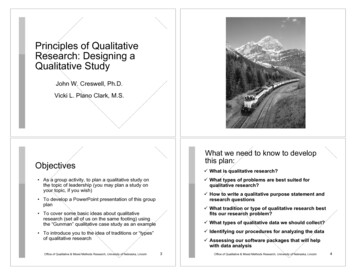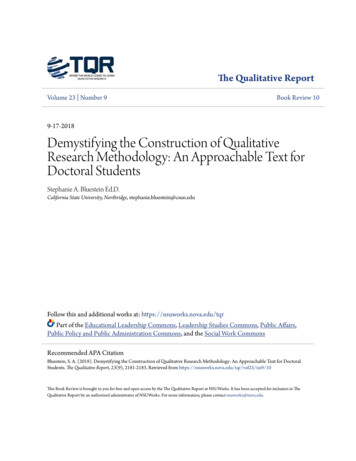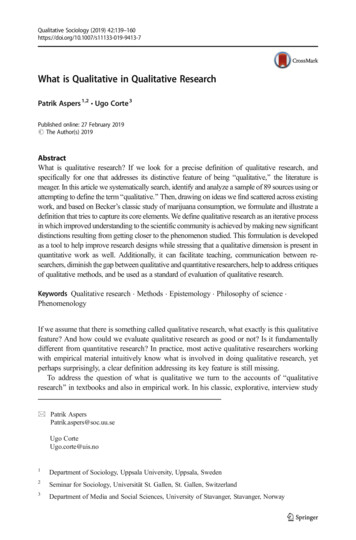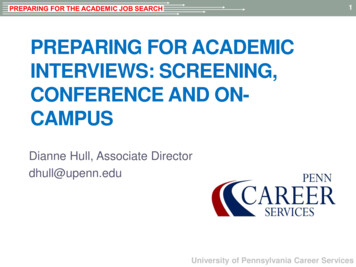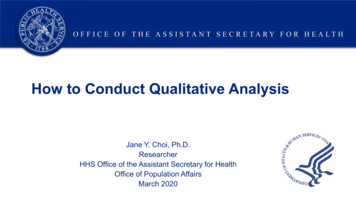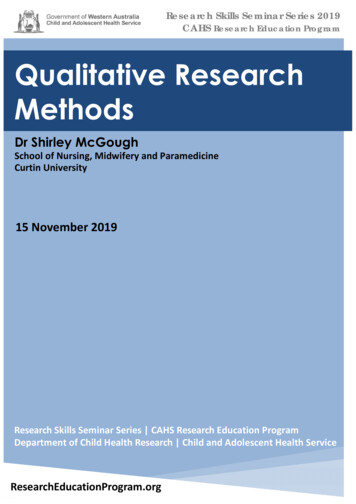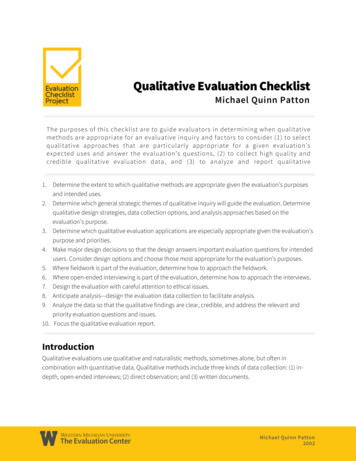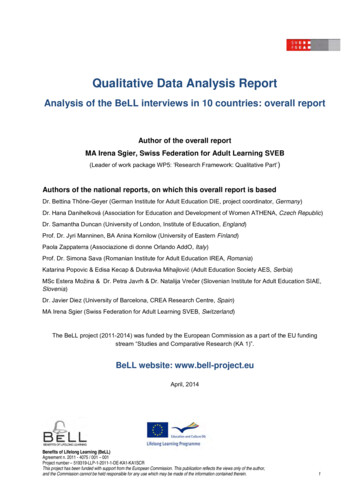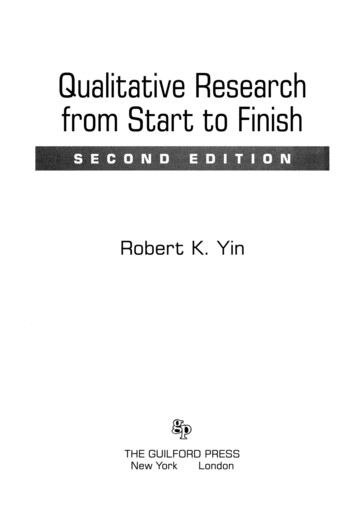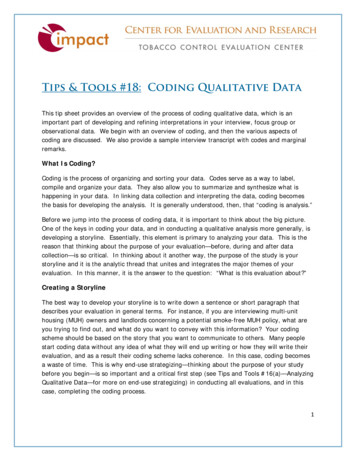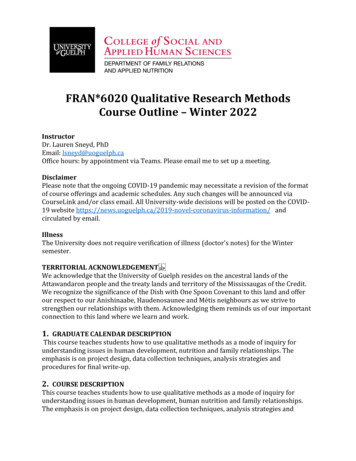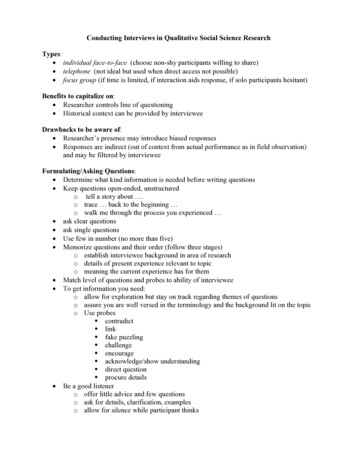
Transcription
Conducting Interviews in Qualitative Social Science ResearchTypes: individual face-to-face (choose non-shy participants willing to share) telephone (not ideal but used when direct access not possible) focus group (if time is limited, if interaction aids response, if solo participants hesitant)Benefits to capitalize on: Researcher controls line of questioning Historical context can be provided by intervieweeDrawbacks to be aware of: Researcher’s presence may introduce biased responses Responses are indirect (out of context from actual performance as in field observation)and may be filtered by intervieweeFormulating/Asking Questions: Determine what kind information is needed before writing questions Keep questions open-ended, unstructuredo tell a story about .o trace back to the beginning o walk me through the process you experienced ask clear questions ask single questions Use few in number (no more than five) Memorize questions and their order (follow three stages)o establish interviewee background in area of researcho details of present experience relevant to topico meaning the current experience has for them Match level of questions and probes to ability of interviewee To get information you need:o allow for exploration but stay on track regarding themes of questionso assure you are well versed in the terminology and the background lit on the topico Use probes contradict link fake puzzling challenge encourage acknowledge/show understanding direct question procure details Be a good listenero offer little advice and few questionso ask for details, clarification, exampleso allow for silence while participant thinks
Making an Interview Protocol Form About five pages Preambleo Heading Study title Time, Date, Place Interviewer, Intervieweeo Instructions (opening statements) to interviewee release form approximate length of interview purpose of research methods of disseminating results Questionso five issues relating to key research question and probes to follow responseso transition messages for interviewero space to record interviewee responseso space to record interviewer reflections Closureo Write reminder to thank intervieweeo assure confidentialityo ask permission to follow-upRecording procedureUse audiotapeLapel mic for interviewer and interviewee bestArrange for transcription equipment/personnel ahead of timeAssure tapes used work with transcription equipmentTake hand-written notes in additionRecognize difficulty of taking notes/listening/asking questionsRecognize that information will be lost/inexactUse two researchers if audiotape not possibleReference Resources[1-4]1.2.3.4.Creswell, J.W., Research Design: Qualitative, Quantitative, and Mixed MethodsApproaches. 2nd ed. 2002, Thousand Oaks, CA: Sage Publications.Creswell, J.W., Qualitative Inquiry and Research Design: Choosing Among FiveTraditions. 1998: Sage Publications.Berry, R.S.Y. Collecting Data by In-depth Interviewing. in British Educational ResearchAssociation Annual Conference. 1999. University of Sussex at Brighton.Doyle, J.K., Handbook for IQP Advisors and Students: Chapter 11: Introduction toInterviewing Techniques. 2004, Worcester Polytechnic Institute.
DRAFTInterview Questions with Potential ProbesExploring Learning Factors During a Process Based Assessment Workshop1. Take me back through the history in your career that brought you to this institute.What types of professional development have you previously experienced?What is your background working with faculty in professional development?What is an area of strength or expertise for you in the science of learning?2. Can you describe some details of what you have gained from this institute?What about your gains as a learner?Is this experience similar to your expectations?What is your previous learning experience in this type of environment?3. Can you walk me through the personal learning process you have gone through as aparticipant in the institute?Have your feelings about doing assessment changed during the institute?How did you feel at the beginning, middle, and end of each day?4. What factors most helped/hindered your learning during the institute?Why?How?Here is list of potential factors that may help you What were some challenges you faced in the last few days here? Why?What activities gave you the most success in achieving your goals here? Why?5. Can you describe a specific incident that sparked significant growth for you during theinstitute?How about growth potential?If no incident comes to mind, how about a task or exercise?Why was this incident significant?What will the future impact of this incident be?
Interview Protocol FormProject: Exploring Learning of Assessment during a “Process Based” Faculty rvieweeRelease form signed?Notes to interviewee:Thank you for your participation. I believe your input will be valuable to this researchand in helping grow all of our professional practice.Confidentiality of responses is guaranteedApproximate length of interview: 30 minutes, five major questionsPurpose of research:For adult learners improving their assessment practice, what factors mediate inlearning and performance improvements during a workshop?i.What challenges do they face?ii.What are the cultural norms for assessment practice?iii.What are the challenges to transfer beyond the workshopboundaries?iv.What are the motivations of the faculty?v.What factors of the learning environment are important?vi.How important is practice with feedback?vii.What is faculty conceptualization of assessment when entering theworkshop?Methods of disseminating results: ?
1. Take me back through the history in your career that brought you to this institute.What types of professional development have you previously experienced?What is your background working with faculty in professional development?What is an area of strength or expertise for you in the science of learning?Response from Interviewee:Reflection by Interviewer
2. Can you describe some details of what you have gained from this institute?What about your gains as a learner?Is this experience similar to your expectations?What is your previous learning experience in this type of environment?Response from Interviewee:Reflection by Interviewer
3. Can you walk me through the personal learning process you have gone through as aparticipant in the institute?Have your feelings about doing assessment changed during the institute?How did you feel at the beginning, middle, and end of each day?Response from Interviewee:Reflection by Interviewer
4. What factors most helped/hindered your learning during the institute?Why?How?Here is list of potential factors that may help you What were some challenges you faced in the last few days here? Why?What activities gave you the most success in achieving your goals here? Why?Response from Interviewee:Reflection by Interviewer
5. Can you describe a specific incident that sparked significant growth for you during theinstitute?How about growth potential?If no incident comes to mind, how about a task or exercise?Why was this incident significant?What will the future impact of this incident be?Response from Interviewee:Reflection by Interviewer Closureo Thank you to intervieweeo reassure confidentialityo ask permission to follow-up
Conducting Interviews in Qualitative Social Science ResearchType:individual face-to-face (choose non-shy participants willing to share)?Number6-12try for six during/immediately after workshop3 interviewersconduct two interviews eachthree or six more (by telephone if necessary) as soon after workshop as possible3 interviewersconduct two interviews each?Length30 minutes or less?LocationSeparate room available in SUB?ME conference room?offices via telephone or in person?Interview Protocol FormStandard for all interviews performed?Recording procedureAudiotape format?Lapel mic for interviewer and interviewee best?Single tape recorder device with one mic? Recording device to useTranscription?Arrange for transcription equipment/personnel?Assure tapes used work with transcription equipmentTake hand-written notes in additionUse interview protocolSingle interviewer OK as long as audio recording devices working
Arrange for transcription equipment/personnel ahead of time Assure tapes used work with transcription equipment Take hand-written notes in addition Recognize difficulty of taking notes/listening/asking questions Recognize that information will be lost/inexact Use two researchers if audiotape not possible Reference Resources [1-4] 1.
